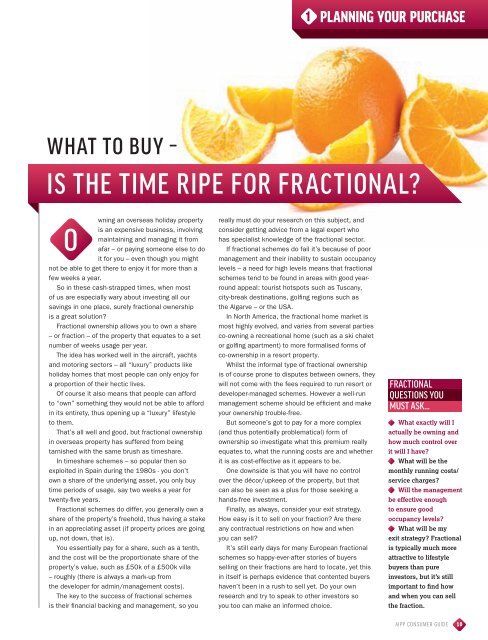How to Buy Overseas Property Safely - Turkish Connextions
How to Buy Overseas Property Safely - Turkish Connextions
How to Buy Overseas Property Safely - Turkish Connextions
Create successful ePaper yourself
Turn your PDF publications into a flip-book with our unique Google optimized e-Paper software.
WHAT TO BUY –<br />
IS THE TIME RIPE FOR FRACTIONAL?<br />
wning an overseas holiday property<br />
is an expensive business, involving<br />
maintaining and managing it from<br />
O afar – or paying someone else <strong>to</strong> do<br />
it for you – even though you might<br />
not be able <strong>to</strong> get there <strong>to</strong> enjoy it for more than a<br />
few weeks a year.<br />
So in these cash-strapped times, when most<br />
of us are especially wary about investing all our<br />
savings in one place, surely fractional ownership<br />
is a great solution?<br />
Fractional ownership allows you <strong>to</strong> own a share<br />
– or fraction – of the property that equates <strong>to</strong> a set<br />
number of weeks usage per year.<br />
The idea has worked well in the aircraft, yachts<br />
and mo<strong>to</strong>ring sec<strong>to</strong>rs – all “luxury” products like<br />
holiday homes that most people can only enjoy for<br />
a proportion of their hectic lives.<br />
Of course it also means that people can afford<br />
<strong>to</strong> “own” something they would not be able <strong>to</strong> afford<br />
in its entirety, thus opening up a “luxury” lifestyle<br />
<strong>to</strong> them.<br />
That’s all well and good, but fractional ownership<br />
in overseas property has suffered from being<br />
tarnished with the same brush as timeshare.<br />
In timeshare schemes – so popular then so<br />
exploited in Spain during the 1980s - you don’t<br />
own a share of the underlying asset, you only buy<br />
time periods of usage, say two weeks a year for<br />
twenty-fi ve years.<br />
Fractional schemes do differ, you generally own a<br />
share of the property’s freehold, thus having a stake<br />
in an appreciating asset (if property prices are going<br />
up, not down, that is).<br />
You essentially pay for a share, such as a tenth,<br />
and the cost will be the proportionate share of the<br />
property’s value, such as £50k of a £500k villa<br />
– roughly (there is always a mark-up from<br />
the developer for admin/management costs).<br />
The key <strong>to</strong> the success of fractional schemes<br />
is their fi nancial backing and management, so you<br />
really must do your research on this subject, and<br />
consider getting advice from a legal expert who<br />
has specialist knowledge of the fractional sec<strong>to</strong>r.<br />
If fractional schemes do fail it’s because of poor<br />
management and their inability <strong>to</strong> sustain occupancy<br />
levels – a need for high levels means that fractional<br />
schemes tend <strong>to</strong> be found in areas with good yearround<br />
appeal: <strong>to</strong>urist hotspots such as Tuscany,<br />
city-break destinations, golfi ng regions such as<br />
the Algarve – or the USA.<br />
In North America, the fractional home market is<br />
most highly evolved, and varies from several parties<br />
co-owning a recreational home (such as a ski chalet<br />
or golfi ng apartment) <strong>to</strong> more formalised forms of<br />
co-ownership in a resort property.<br />
Whilst the informal type of fractional ownership<br />
is of course prone <strong>to</strong> disputes between owners, they<br />
will not come with the fees required <strong>to</strong> run resort or<br />
developer-managed schemes. <strong>How</strong>ever a well-run<br />
management scheme should be effi cient and make<br />
your ownership trouble-free.<br />
But someone’s got <strong>to</strong> pay for a more complex<br />
(and thus potentially problematical) form of<br />
ownership so investigate what this premium really<br />
equates <strong>to</strong>, what the running costs are and whether<br />
it is as cost-effective as it appears <strong>to</strong> be.<br />
One downside is that you will have no control<br />
over the décor/upkeep of the property, but that<br />
can also be seen as a plus for those seeking a<br />
hands-free investment.<br />
Finally, as always, consider your exit strategy.<br />
<strong>How</strong> easy is it <strong>to</strong> sell on your fraction? Are there<br />
any contractual restrictions on how and when<br />
you can sell?<br />
It’s still early days for many European fractional<br />
schemes so happy-ever-after s<strong>to</strong>ries of buyers<br />
selling on their fractions are hard <strong>to</strong> locate, yet this<br />
in itself is perhaps evidence that contented buyers<br />
haven’t been in a rush <strong>to</strong> sell yet. Do your own<br />
research and try <strong>to</strong> speak <strong>to</strong> other inves<strong>to</strong>rs so<br />
you <strong>to</strong>o can make an informed choice.<br />
1 PLANNING YOUR PURCHASE<br />
FRACTIONAL<br />
QUESTIONS YOU<br />
MUST ASK…<br />
What exactly will I<br />
actually be owning and<br />
how much control over<br />
it will I have?<br />
What will be the<br />
monthly running costs/<br />
service charges?<br />
Will the management<br />
be effective enough<br />
<strong>to</strong> ensure good<br />
occupancy levels?<br />
What will be my<br />
exit strategy? Fractional<br />
is typically much more<br />
attractive <strong>to</strong> lifestyle<br />
buyers than pure<br />
inves<strong>to</strong>rs, but it’s still<br />
important <strong>to</strong> fi nd how<br />
and when you can sell<br />
the fraction.<br />
AIPP CONSUMER GUIDE 10


